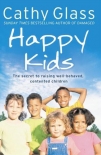Happy Kids by Cathy Glass (best autobiographies to read .txt) 📕

Read free book «Happy Kids by Cathy Glass (best autobiographies to read .txt) 📕» - read online or download for free at americanlibrarybooks.com
- Author: Cathy Glass
Read book online «Happy Kids by Cathy Glass (best autobiographies to read .txt) 📕». Author - Cathy Glass
At the age of twenty-one my daughter was prosecuted for being caught on public transport without a ticket. She had got to the train station in a rush that morning, and then found she didn’t have enough money for the ticket. There were plenty of options she could have chosen to overcome the problem – options that would have presented themselves to an older adult – but already late, she panicked and slipped past the ticket inspector and on to the train, only to be caught two stops up when an inspector boarded the train and asked to see her ticket. She said nothing to me at the time, but brooded on what had happened and hoped the problem would go away. Only when a summons arrived for her to appear in court did she break down and tell me. To make matters worse her act had been caught on the station’s CCTV and it appeared as premeditated fare evasion.
I didn’t need to lecture her or point out that she had acted foolishly – she was beside herself with worry and remorse. What I did was practical: I found a solicitor to represent her and then gave her support by accompanying her to court. It was a gruelling experience for us both, but with a good character reference and an honest confession by her about what she had done, the magistrates accepted it was a one-off error of judgement and fined her, which meant she didn’t have the criminal record that would have resulted had she been found guilty of fare evasion. I had considered my daughter level headed and reasonably mature, but finding herself in a difficult situation, she had acted as an impulsive teen rather than a mature adult.
Enjoy
Parenting young adults isn’t only about keeping them on track and giving support and guidance when necessary. It’s also about enjoying their company through quality time together. Young adults, while still needing (to varying degrees) your direction and support, can be great company and great fun; they have a freshness and vitality that are often lacking in older adults, who are weighed down by responsibility and reality. With the hard work of the early years of child rearing behind you, you can now enjoy quality time with your young adult.
Obviously the way you spend time together will be very different from when your child was little and you took them to the park or played with building bricks. But it is just as important for you to spend time together now, especially if your young adult is still living at home. If your son or daughter has moved out or is away at college, then when he or she visits there will be a sense of occasion, and you will stop what you are doing to be with them. However, if your young adult is still living with you, it is possible to coexist in the house, taking each other for granted, without appreciating what a lovely person he or she has grown into. Make the most of your young adult, spend time with him or her, and appreciate what he or she has become. Their success is down to your hard work and direction, and all too soon they will have flown the nest and have children of their own.
Conclusion
It was once said of me, by way of criticism, that I see only the good in people. This was said in respect of a child’s appalling behaviour, which I didn’t blame the child for and which I knew I could change. I am not naïve, as this criticism suggests, but from years of fostering, I believe most strongly that children (and adults) are the product of their environment; and the single most influential factor in that environment is the parents and their parenting skills. Raising the next generation carries a huge responsibility and, as parents, we are given sole responsibility for what is arguably the most important, demanding and potentially society-changing job, without training or support. I hope this book goes some way to rectifying that and filling the void.
Fortunately you will have many years in which to hone your parenting skills – eighteen or more – so even if you feel your parenting hasn’t gone too well so far, there is plenty of time to improve your relationship with your child, as well as his or her behaviour, using the guidelines described in this book. And if you have a young baby, it is never too early to start. Request, Repeat and Reassure will establish a routine on which you can build, leading to a contented toddler, a well-behaved child and a sociable, empathetic adult.
I’ll leave you with an old Chinese proverb: one generation plants the trees; another gets the shade – i.e. what you do for your children is an investment not only in their future, but also in the future of those to come.
Good luck and God bless.





Comments (0)